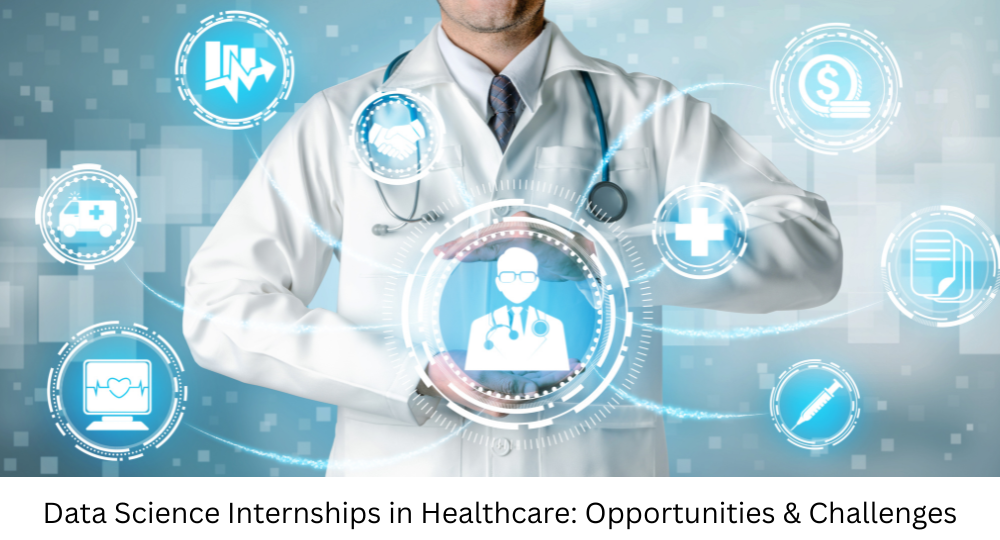Data Science Internships in Healthcare: Opportunities & Challenges

Have you ever wondered how your health data helps doctors make better decisions or how hospitals predict patient outcomes? That’s data science at work. Healthcare is not just about doctors and medicine anymore — data scientists are playing a huge role behind the scenes. And if you’re looking to break into this field, an internship is your golden ticket.
💡 Understanding the Role of Data Science in Healthcare
Data Science Applications in Healthcare
From diagnosing diseases with image recognition to predicting hospital readmissions, data science is transforming patient care. Hospitals are using machine learning models to optimize treatment plans, while insurance companies rely on predictive analytics to manage risk.
Importance of AI, ML & Big Data in Medical Settings
Healthcare generates massive amounts of data daily — think electronic health records (EHR), lab reports, and real-time monitoring devices. That’s where AI and ML come in, crunching that data to find patterns, anomalies, and insights that even experienced doctors might miss.
The Shift from Traditional to Data-Driven Healthcare
Gone are the days when decisions were purely based on intuition. Now, evidence-backed, algorithm-driven decisions are becoming the norm in hospitals and clinics.
🎓 Types of Data Science Internships in Healthcare
Clinical Data Analysis Internships
These roles involve analyzing patient records, lab results, and hospital operations. You’ll learn how to work with messy, real-world datasets.
Health Informatics and EHR-Based Projects
Health informatics internships dive into electronic health records, standardizing, cleaning, and deriving insights from structured and unstructured medical data.
Pharmaceutical & Drug Development Internships
Data science is vital in clinical trials — tracking results, forecasting side effects, and ensuring safety compliance. Interns here may use survival analysis, statistical modeling, or NLP.
Biotech & Genomics Research Roles
Work with gene sequencing data, predict genetic disorders, or assist in building ML models for disease classification.
🛠️ Skills Required to Land a Healthcare Data Science Internship
Technical Skills (Python, R, SQL, ML)
Solid grasp of programming languages like Python, libraries like Pandas and Scikit-learn, and database querying is a must.
Domain Knowledge in Biology or Medicine
You don’t need to be a doctor, but understanding basic human anatomy, clinical workflows, or medical jargon helps a lot.
Tools & Platforms
Get familiar with visualization tools like Tableau, platforms like SAS, and deep learning frameworks like TensorFlow or PyTorch.
🌐 Where to Find These Internships
Top Healthcare Companies Offering Internships
- Mayo Clinic
- Johnson & Johnson
- Pfizer
- UnitedHealth Group
- Roche
Research Institutions and Hospitals
Academic medical centers like Stanford Medicine, Johns Hopkins, and AIIMS frequently offer data science internships.
Online Platforms & Networking
LinkedIn, Handshake, and Kaggle often list internship opportunities. Networking through GitHub, conferences, or even Reddit can open doors too.
🏆 Benefits of Interning in Healthcare Data Science
Real-World Exposure to Healthcare Systems
You get to work with live datasets, understand healthcare operations, and see how your work affects real lives.
Career Growth & High Demand
The healthcare sector is projected to grow faster than most industries — data science skills make you highly employable here.
Working on Meaningful Problems
Whether it’s cancer prediction or reducing ER wait times, your work truly makes a difference.
⚠️ Common Challenges Faced by Interns
Dealing with Sensitive Health Data
Patient data is strictly confidential. Mishandling it can have legal consequences.
Navigating Regulatory Compliance (HIPAA, GDPR)
Interns must be aware of privacy laws. Many healthcare datasets come with redacted identifiers or limited access.
Complex, Unstructured Data
Healthcare data isn’t always neat. Free-text doctor notes, inconsistent entries, and gaps can pose problems.
Communication Gap Between Tech & Medical Experts
Doctors speak in symptoms; data scientists speak in variables. Learning to bridge that gap is part of the internship journey.
📚 How to Prepare for a Healthcare Data Science Internship
Build a Healthcare-Specific Portfolio
Contribute to healthcare Kaggle competitions, or build dashboards analyzing COVID data.
Learn Key Healthcare Terminologies
Resources like Coursera’s “AI for Medicine” or “Healthcare Data Literacy” can be useful.
Contribute to Open-Source or Research Projects
Collaborate on GitHub projects or volunteer for healthcare hackathons.
💬 Internship Success Stories
Case Study 1: From Intern to Full-Time Data Scientist
Meet Ananya, a CS grad who interned at a hospital’s analytics department. After building a tool to predict patient no-shows, she was offered a full-time role immediately post-internship.
Case Study 2: Predictive Analytics in Patient Readmission
At a biotech firm, Ravi built a logistic regression model predicting patient readmission. His work helped reduce readmissions by 12% in a pilot test.
🚀 Future Trends Shaping Healthcare Data Science Internships
Rise of Remote Internships
Post-pandemic, many companies now offer virtual internships, allowing broader access.
AI-Driven Diagnostics and Personalized Medicine
Interns may soon work on tools that personalize treatment based on DNA or lifestyle.
Data Interoperability in HealthTech
Efforts are being made to make hospital systems talk to each other seamlessly — this is where future interns can play a big role.
📝 Conclusion
Healthcare and data science are a match made in heaven. The field is exploding with opportunities, and internships are your first step in. Yes, there are challenges — from dealing with complex data to understanding medical nuances — but the rewards? They’re life-changing. So gear up, level up your skills, and dive into the world where coding meets care.
❓ FAQs
1. What background do I need for a healthcare data science internship?
A combination of programming skills, statistics, and a basic understanding of healthcare systems is ideal.
2. Is prior healthcare experience mandatory?
No, but familiarity with healthcare terms and challenges gives you an edge.
3. How long do these internships typically last?
They usually range from 8 to 12 weeks, depending on the company or institution.
4. Are remote internships available in this field?
Yes, especially post-COVID, many organizations offer virtual internships.
5. What’s the average stipend for such internships?
It varies widely but typically ranges between $500 to $3000/month based on location and company.
Comments
Post a Comment